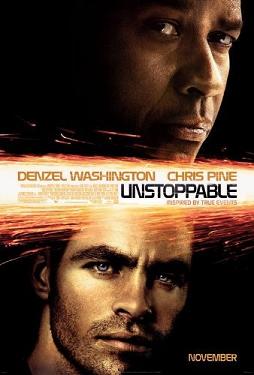
SUBMIT TO THE THRILL RIDE
I loved Unstoppable.
I loved every improbable, electric minute of Tony Scott’s runaway train movie. I loved its ludicrous start. I loved its “Why didn’t they do that in the first place? Because then we wouldn’t have a movie” ending. Most of all, I love the fact that it’s red meat for the Great Tony Scott debate – is he a cinematic genius or a cinematic vandal?
First and foremost, Unstoppable returns Scott to his best action instincts with appealing simplicity. A runaway train loaded with toxic chemicals cruises through rural Pennsylvania toward a certain derailment among thousands of people. Denzel Washington — all relaxed and authoritative — and Chris Pine are the Veteran-Rookie and Conductor team who chase down the “missile the size of the Chrysler building.” The chase includes relentless pace, a dead-man’s-curve, and a spectacular attempt to drop a Marine onto the bullet train from a helicopter.
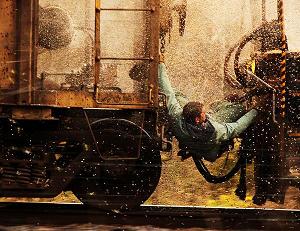 Yet Unstoppable isn’t really a movie about a runaway train. It’s a movie about a runaway society. Like Domino, it portrays a rapidly changing America struggling with disintegrating institutions and identities. It’s set in fossilizing towns of blue-collar Pennsylvania, focusing on a rusting railway industry that once signified American industrial power. Now it seems like a leftover of the past.
Yet Unstoppable isn’t really a movie about a runaway train. It’s a movie about a runaway society. Like Domino, it portrays a rapidly changing America struggling with disintegrating institutions and identities. It’s set in fossilizing towns of blue-collar Pennsylvania, focusing on a rusting railway industry that once signified American industrial power. Now it seems like a leftover of the past.
Within its high-speed antics, Mark Bombeck’s script quietly ties in almost every social anxiety ailing our country in recent years – failing elites, corporate malfeasance, cronyism, unionized incompetence, downsizing, the devaluation of age and experience, cost-benefit anti-morality, creaky crisis management systems exposed by the test of reality, and that lingering suspicion that we’re going to turn on the television any day and watch thousands die. I’m sorry, friends of The Social Network. That was the decade I just lived.
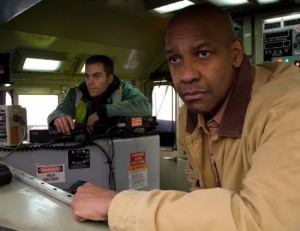 With the institutional rot and breakdown, it naturally falls to a pair of workaday palookas to save the day. The problem is that they don’t trust each other. Frank Barnes the engineer is a veteran being forced into retirement. Young conductors like Will Colson are snatching their jobs through connections and favoritism. Needless to say, it’s not a happy cabin, and Pine chose the wrong day for a first-day-of-work. Like the passengers of United Flight 93, they are ordinary people deputized by fate to stop a disaster.
With the institutional rot and breakdown, it naturally falls to a pair of workaday palookas to save the day. The problem is that they don’t trust each other. Frank Barnes the engineer is a veteran being forced into retirement. Young conductors like Will Colson are snatching their jobs through connections and favoritism. Needless to say, it’s not a happy cabin, and Pine chose the wrong day for a first-day-of-work. Like the passengers of United Flight 93, they are ordinary people deputized by fate to stop a disaster.
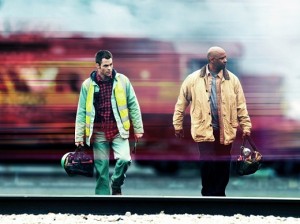 Their chase takes place underneath the pestilent eye of modern communication – the railway sensors, the two-way radios, the news choppers attracted to the possibility of death. Everyone knows a little. The audience knows some. Corporate busybodies know something else. The control room (headed by a strong Rosario Dawson) knows a little more. Evaporating the space among them is Scott’s filtered, fast-edit, multi-camera ping-pong style, a frequent target of criticism. However, the style simulates a world of multiple isolated viewpoints, built from pieces, lingering in fracture and distortion.
Their chase takes place underneath the pestilent eye of modern communication – the railway sensors, the two-way radios, the news choppers attracted to the possibility of death. Everyone knows a little. The audience knows some. Corporate busybodies know something else. The control room (headed by a strong Rosario Dawson) knows a little more. Evaporating the space among them is Scott’s filtered, fast-edit, multi-camera ping-pong style, a frequent target of criticism. However, the style simulates a world of multiple isolated viewpoints, built from pieces, lingering in fracture and distortion.
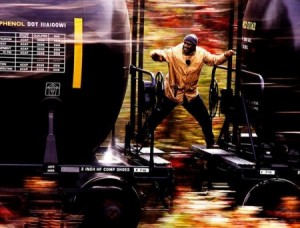 For all the larger social forces acting upon the train chase, Scott evinces a remarkable belief in the individual. As the corporate figures falsely present their evil calculations as certainties, Scott places an enormous amount of faith in hunches and experience. When Washington and Pine finally catch the train they even use ancient railworkers’ hand signals. They’re like ancient mariners communicating in a dead code. It is part of a story that shows faith in the regenerative powers of all things human.
For all the larger social forces acting upon the train chase, Scott evinces a remarkable belief in the individual. As the corporate figures falsely present their evil calculations as certainties, Scott places an enormous amount of faith in hunches and experience. When Washington and Pine finally catch the train they even use ancient railworkers’ hand signals. They’re like ancient mariners communicating in a dead code. It is part of a story that shows faith in the regenerative powers of all things human.
kevinbowen @ stageandcinema.com
Unstoppable
rated PG-13
now playing nationwide